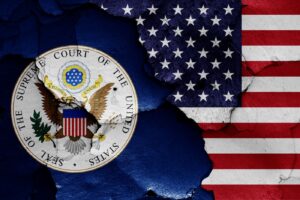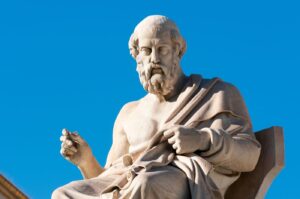Vanderbilt University has decided that Christian student groups that hold traditional Christian religious views are not welcome on campus. They will no longer be recognized as valid student organizations. Vanderbilt’s reason is that such groups require that their leaders be Christian—that is, that their leaders embrace certain core principles of Christianity and try to live according to these principles. In Vanderbilt’s view, religious beliefs and standards “discriminate” against those students who do not subscribe to them. Therefore, student religious groups with religious beliefs and standards are banned.
The situation would be unbelievable—were it not true. The issue came to a head this year when a student group at Vanderbilt Law School, the Christian Legal Society, submitted its “constitution” to the university. The constitution provided that the group’s leaders should believe in the Bible and in Jesus Christ as their Lord and savior; that they should be willing to lead members in worship, prayer, and Bible study; and that they should “strive to exemplify Christ-like qualities.” Vanderbilt’s Director of Religious Life, Reverend Gretchen Person, replied that such views were forbidden. Vanderbilt’s policies “do not allow” religious groups to have such an “expectation/qualification of officers,” she wrote. Last week, the administration officially declared the policy that Vanderbilt will exclude student religious groups that “impose faith-based or belief-based requirements for membership or leadership.”
As weird as it may sound—and as ridiculous as Vanderbilt’s actions may be—this is entirely within Vanderbilt’s constitutional rights: Vanderbilt has the right to be as hostile to orthodox Christianity and to suppress its faithful exercise on its campus as it wishes. Vanderbilt’s status as a private university gives it the First Amendment right to take whatever position it wants on the exercise of religion within its university community. Vanderbilt University has the right to despise Christianity (and other faiths, too) if it so chooses.
Of course, having a right to do something does not make it the right thing to do. And Vanderbilt’s policy is, undeniably, an embarrassing example of political correctness run horribly amok, of intellectually incompetent administrators, and of institutional hypocrisy. But in Vanderbilt’s bad example lies a parable rich in irony about constitutional freedom under the First Amendment.
Start with first principles. Groups, as well as individuals, possess the “freedom of speech.” Just as individuals get to control the content of their own expression, groups of individuals, joining their voices together in some common association, have the right to control their collective message. Thus, a vital principle of the First Amendment as it applies to private groups, associations, and institutions—including private universities—is that such groups have nearly absolute freedom to create and maintain their own distinctive group expressive identities: to decide what they stand for and what views they will express.
Start your day with Public Discourse
Sign up and get our daily essays sent straight to your inbox.This is the freedom that supports the right of private religious colleges to maintain their distinctive religious identities. And the same freedom equally supports the right of Vanderbilt University to maintain a distinctive anti-religious identity. In each case, the institution may embrace the principles that define it as a group and exclude or suppress messages at odds with the values for which the institution wishes to stand.
As the U.S. Supreme Court has recognized a dozen times, a group’s freedom to control its own message and identity means that it cannot be forced to include as members persons whose messages it does not want to embrace or express. The Democratic Party can limit its delegate selection process to registered Democrats (Democratic Party v. Wisconsin, 1980). The Boy Scouts may exclude a gay scoutmaster whose views and lifestyle do not conform to the Scouts’ message or purposes (Boy Scouts of America v. Dale, 2000). A privately sponsored St. Patrick’s Day parade need not accept contingents whose political messages the parade organizers do not wish to sponsor (Hurley v. GLIB, 1995). The only exception is conduct in a purely commercial setting where a group is not really engaged in expressing a message at all, but merely doing business (Roberts v. Jaycees, 1984), and even this tightly limited “commercial” exception is much debated. The outer bounds of “the freedom of expressive association” are disputed, but this much is clear: If a private group is actually engaged in expression and wishes to maintain its distinctive expressive identity, it cannot be forced by government to include in its group persons or messages antithetical to its message.
That is precisely what Vanderbilt has done—for better or for worse. Vanderbilt is a private university engaged in forming its own distinctive expressive identity. As such, it is free to choose from any of a number of possible views. It could choose to embrace specific religious principles and exclude the expression of other ones. (Many religious colleges do this, to different degrees.) It could embrace religious freedom, diversity, and tolerance for different student groups. (Many private colleges and universities, of all different kinds, do this.) Or it could choose to exclude or suppress the expression of religious views of which it disapproves. Vanderbilt has chosen this last course. It has chosen to exclude groups expressing messages with which it disagrees, for its own secular reasons.
Vanderbilt has a history of excluding groups that express messages antithetical to the one it wants to convey. Well into the 1960s it was a racially segregated institution that excluded blacks from its undergraduate and most graduate programs. In 1960, the university expelled a black Divinity School student, James Lawson, for his participation in peaceful sit-in protests of lunch-counter segregation in the Nashville community. It is perhaps in (unthinking) hypersensitivity to its racist past that Vanderbilt has adopted a policy of forbidding campus religious groups to exclude members on the basis of religious belief. Ironically, in so doing Vanderbilt has done just what it did in an earlier era: expel the expression of views of which it disapproves.
One may disagree with Vanderbilt’s principles of exclusion, now as then. I certainly do: the idea that Christian groups should be excluded for being Christian is downright ludicrous—an Orwellian perversion of Vanderbilt’s stated commitment to diversity. In its own way, it is as unbelievable as excluding James Lawson for his commitment to racial justice.
Freedom sometimes protects one’s ability to do wrong. It is Vanderbilt’s First Amendment right to exclude the groups and messages it wants excluded from its campus and its community. (The one exception is race, under a series of congressional acts and court decisions dating to the Civil War and the abolition of slavery, upholding federal power to prohibit private subjugation and exclusion on the basis of race.) To borrow a metaphor from Hurley—the unanimous St. Patrick’s Day parade decision—Vanderbilt University’s student body, faculty, and student organizations are part of its parade. It can decide which messages and parade contingents it wants to include in its parade, and which ones it doesn’t.
There is a further, bitter irony in all this. The reason why Vanderbilt may discriminate against religion is precisely the same principle of freedom that Vanderbilt denies to religious groups on its campus—the freedom to form its own expressive identity. Vanderbilt purports to be liberal and tolerant of different views. But its university officials do not appear to understand what this means. They think the university is being open-minded by requiring student groups, including religious groups, to conform to university officials’ view of orthodoxy. This is not so much hypocritical or cynical (though it may be that as well) as simply embarrassingly ignorant. Vanderbilt does not appear even to recognize that its actions are intolerant. It thinks it is protecting its community from improper influences, just as it once thought that segregation protected its community.
A final irony: The best legal argument against Vanderbilt’s freedom to suppress Christianity and other traditional religions flows from a recent Supreme Court decision that at first appears to support Vanderbilt’s power to do so—Christian Legal Society v. Martinez (2010), a case involving another Christian Legal Society chapter, at a state university law school. The Court, by vote of 5–4, held that a state university could exclude a Christian student group if it disapproved of its religious faith standards for membership or leadership, as long as the university’s exclusion rule applied to all student groups equally. Thus the university could require, as a condition of being a campus group, that the group accept “all comers” as members and officers. (The decision, I think, badly interprets general First Amendment principles and prior cases, as the dissent powerfully shows, but that is beside the point for present purposes.)
Clearly, Vanderbilt is mimicking the policy upheld in Christian Legal Society, even though it is a private school. Of course, Christian Legal Society does not require such a policy even at public schools: it is clear that both private and public institutions may allow student groups freedom of association with respect to their membership criteria.
But the significant point here is that Christian Legal Society does not embrace private institutions’ associational freedom—it does not support Vanderbilt’s right to define its expressive community. Instead, Christian Legal Society embraces state power to restrict private groups’ freedom of association as a condition of access to a public square under the state’s control.
And look where that dangerous principle leads: government may restrict private universities’ rights to define their values, mission, and rules of conduct for their community, as a condition of being able to operate in the public sphere or as a condition of some general benefit. Ironically then, Christian Legal Society suggests that the Tennessee legislature (and perhaps even Congress, as a condition attached to federal funds) could require that private educational institutions, like Vanderbilt, take all students and student organizations “as they come,” and not exclude any on the basis of their faith statements and standards. Thus if Christian Legal Society is right, it does not support Vanderbilt’s right to exclude the Christian Legal Society for its membership policies. Rather, it means that government may by law compel Vanderbilt, a private institution, to recognize and embrace the Christian Legal Society chapter against Vanderbilt’s will.
Some favor such compulsion. Indeed, Vanderbilt’s actions could well lead to a lawsuit or legislation seeking to restrict its freedom of expressive identity. In such event, Vanderbilt’s only legal leg to stand on would be that private groups should possess the freedom to define their own mission, identity, and internal membership practices—the very freedom that Vanderbilt denies to its own student organizations.
Such compulsion ultimately would do more harm to religious freedom even than Vanderbilt’s bad conduct. For every Vanderbilt wishing to suppress religious student groups, there is a religious college, secondary school, ministry, or other religious community that wishes to maintain the integrity of its religious principles. (The Christian Legal Society student chapter at Vanderbilt Law School is a perfect example.) No one committed to religious associational freedom should lightly embrace the principle that the State legitimately has authority to prescribe, regulate, or punish the membership practices of a private expressive organization. Tolerating bad apples (like Vanderbilt) means some rotten results. But it also means that good fruit can be borne by good religious institutions that stick to their principles.
Consider in this last respect the infamous Supreme Court case of Berea College v. Kentucky from 1908, in many ways a mirror image of the Christian Legal Society case a century later. Berea College, a small Christian college, insisted as a matter of Christian principle that it was right and proper to teach the races together. But enforced segregation was the political correctness of the time and Kentucky forbade integrated education as a condition of schools’ corporate charters. The Supreme Court ruled for Kentucky and against Berea College, effectively holding that the state could restrict a religious college’s right to define and defend the faith principles governing its religious community.
The awfulness of Berea College v. Kentucky helps explain why even Vanderbilt’s institutional freedom should be protected: for every Vanderbilt there is a Berea College, and one’s freedom cannot exist without the other’s. But it also teaches a broader lesson: the values of freedom and diversity are promoted not through coerced uniformity but by allowing private groups to do as they think best—to define their own principles and practices, and to maintain their own expressive identities as private groups.
Properly understood, the First Amendment requires no less. It therefore protects Vanderbilt’s right to be, as an institution, what it wants to be—to define its own principles. But, in turn, if Vanderbilt is truly committed to freedom and diversity—if that is the expressive identity it desires—it should embrace the same principle for its student groups: campus religious groups should be permitted to be who they want to be. And that means respecting the rights of campus Christian student groups to be Christian and to maintain a Christian identity by expecting their leaders to embrace the religious beliefs, standards, lifestyle, and mission that define the identity of a disciple of Jesus Christ.









